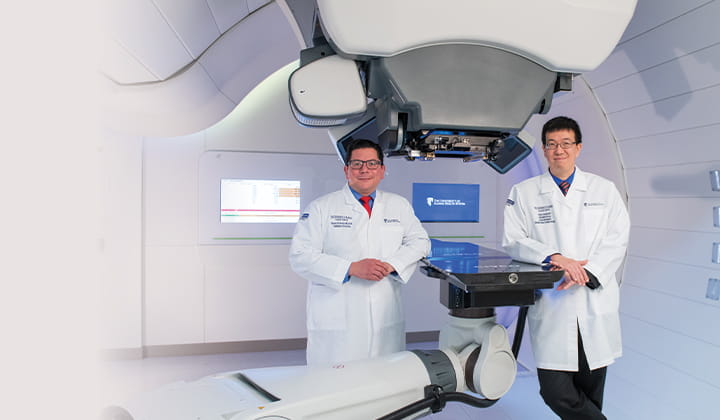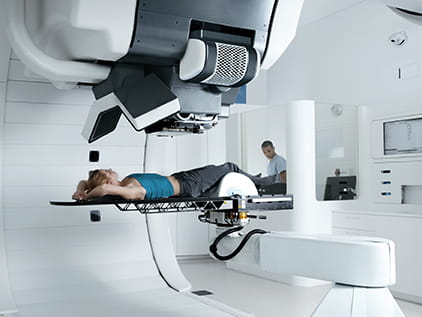Proton Therapy for Your Patients

Trust the region's most experienced and expert proton therapy team
The Proton Therapy Center at The University of Kansas Cancer Center was the first of its kind in Kansas, Kansas City and the surrounding region. It is part of the region’s only National Cancer Institute-designated comprehensive cancer center, 1 of fewer than 60 nationwide, and staffed by a highly trained team of proton experts, who together have more than 115 years of proton therapy experience, all under 1 roof. Since our proton center opened in April 2022, we have successfully treated hundreds of patients.
The best care for your patients.
We are here to assist you in caring for your patients. Call 913-588-5862 to refer.
Proton Therapy Center Virtual Tour
Ronny Rotondo: Welcome to the Proton Therapy Center, Kansas City's first proton center and the 39th proton center in the country. I'm Dr. Ronny Rotondo, medical director of the Proton Therapy Center at The University of Kansas Cancer Center.
Ronald Chen: And I'm Dr. Ronald Chen, chair of radiation oncology. Patients of our Proton Therapy Center receive top of the line care from a team of proton experts unparalleled in their region. This includes nationally and internationally renowned radiation oncologists, medical physicists and dosimetrist.
Ronny Rotondo: These specialists, whom we've recruited from across the country will create a customized treatment plan for each patient. Now, we want to take you inside our NCI comprehensive cancer center's proton therapy center. Here is Jessica Lovell to give you a tour.
Jessica Lovell: Hard at work inside the Proton Therapy Center is a pencil thin beam of light giving new hope to cancer patients across the region and beyond.
Jessica Lovell: Hello, I'm Jessica Lovell and welcome to The University of Kansas Cancer Center. I'm standing in what I like to call, the healing hallway that leads back to the proton treatment room. This is where you'll come after you check in at the front desk.
Jessica Lovell: The dogwoods symbolize rebirth but this wood frame is also symbolic. This curve right here, it's intentional. It represents the Bragg-Peak of the proton beam. The precise point where protons stop on a dime to deliver a prescribed dose of radiation to the tumor but not beyond.
Jessica Lovell: So come along, there's must more to show you.
Jessica Lovell: These are the changing areas where you will wait for treatment. There's an area for men and women. Children wait in here too but don't worry, they have plenty of ways to entertain themselves prior, in a family waiting area with TV, animated games, floor art and interactive programming they can take with them, even into treatment.
Jessica Lovell: Now before I show you the treatment room, I want you to understand the prep work that happens first. All proton therapy patients go through a process called CT simulation and treatment planning in the radiation pavilion just down the hall. The CT scan provides imaging to precisely localize the tumor that will require proton therapy. Here, some patients may have a couple of tattoo dots placed on their body to indicate where the radiation beam will be directed.
Jessica Lovell: No worries about any other medical devices you might have, your medical team knows what to consider and that's all part of your personalized plan.
Jessica Lovell: Are you ready to see the vault? That's what we call the treatment room. Come with me.
Jessica Lovell: One of the first things you'll see is this video projection wall. Patients can select from 14 different scenic lighting and surround themes. There are calming scenes as well as jungles, oceans and even outer space. It's all customizable for children and adults. The room temperature is kept at 70 degrees. That's because the proton equipment produces a lot of heat.
Jessica Lovell: Notice the subdued lighting. There's wifi for music. You may bring your own playlist or podcast too. The cyclotron that delivers the proton therapy is behind that locked door. The nozzle delivers the pencil thin beam of protons to the patient. The patient lays on the table, this is when the mask is positioned, if you have one. Images are taken, rotating 220 degrees as the treatment can be delivered from multiple angles and then the nozzle is set. The therapists then exit the treatment room and go to the console area to deliver the treatment.
Jessica Lovell: No worries, cameras and microphones mean the therapists can still see and hear you. Your tumor type determines the number of beams and the length of treatment.
Jessica Lovell: There is absolutely no pain from proton therapy. In fact, you can't even feel the proton beam at all.
Jessica Lovell: While treatment deliver takes just a few minutes, on average it takes 30 minutes to position patients perfectly. There is anesthesia for children and adults who may need it.
Jessica Lovell: Once your treatment is done, you may leave unless it's an exam day. Exams with your doctor happen every five treatments or more often as needed.
Jessica Lovell: Okay, there's just one more thing I wanna show you and that's the proton therapy bell that sits across from the nursing station. When your treatments are done, you'll get to ring it and we'll be right there celebrating with you.
Jessica Lovell: Remember, our medical team is a combination of highly skilled and nationally renowned proton therapy experts available in the region only at The University of Kansas Cancer Center and we thank you for trusting us with your cancer care.

Proton therapy in Kansas City
Receive lifesaving proton therapy treatment from the region's most experienced team of proton experts.
Clinical benefits of proton therapy
Proton therapy is the most advanced form of radiation therapy for cancerous tumors currently available. More than 800 clinical studies have been published on proton therapy. Recent research published in the journal JAMA Oncology found that people who have proton therapy are 2/3 less likely to experience side effects requiring hospitalization than people who have traditional X-ray or photon radiation.
Most solid, localized tumors can be treated with proton therapy. This includes tumors in the central nervous system and lymphatic system, as well as recurring tumors. Proton therapy may be a treatment option for a number of adult and pediatric cancers, including cancers of the brain and central nervous system, breast, esophagus, head and neck, liver, lung, lymphatic system, eyes, pancreas, prostate, bone and others.
High-level benefits
- Focused, precise radiation
- Less damage to nearby healthy tissue
- Fewer short- and long-term side effects
- Lower risk of secondary cancers
- Increased quality of life
Why the University of Kansas Cancer Center?
- Our Proton Therapy Center is part of the region’s only NCI-designated comprehensive cancer center, 1 of fewer than 60 nationwide.
- Patients treated at NCI-designated cancer centers have a 25% greater chance of survival than patients treated at other cancer centers.
- Our team of proton experts has more than 115 years of combined proton therapy experience all under 1 roof. These 30 proton experts include nationally and internationally renowned radiation oncologists, medical physicists, dosimetrists and proton radiation therapists.
- Because our proton center is part of an NCI-designated comprehensive cancer center, proton therapy is but one part of an overall comprehensive cancer care plan we provide.
- Our proton radiation oncologists are disease-specialized (brain, breast, GI, pediatric, prostate, etc.).
- We use the world’s leading proton equipment from IBA ProteusOne®, which provides the most precise imaging and pencil beam technology. More than 100,000 patients worldwide have been treated with IBA equipment, far more than any other proton manufacturer.
- Having cancer isn’t easy, affordable or convenient, so we offer support for our patients and families, connecting you with necessary resources, including nurse navigators, financial counselors, social workers, onco-psychologists, dietitians and scheduling assistance.
Our concierge services
The physician relations team is a single, centralized point of contact for:
- Meeting coordination between you and our specialists
- Information on specialized programs and services for your patients
- Grand rounds virtual series, CME and other educational opportunities
- Clinical trial information
- Addressing questions and concerns, meeting ongoing needs and working collaboratively
Contact physician relations
Our goal is to support referring physicians. We welcome your request for a visit anytime. Contact the physician relations team at PhysicianRelationsTeam@KUMC.edu.